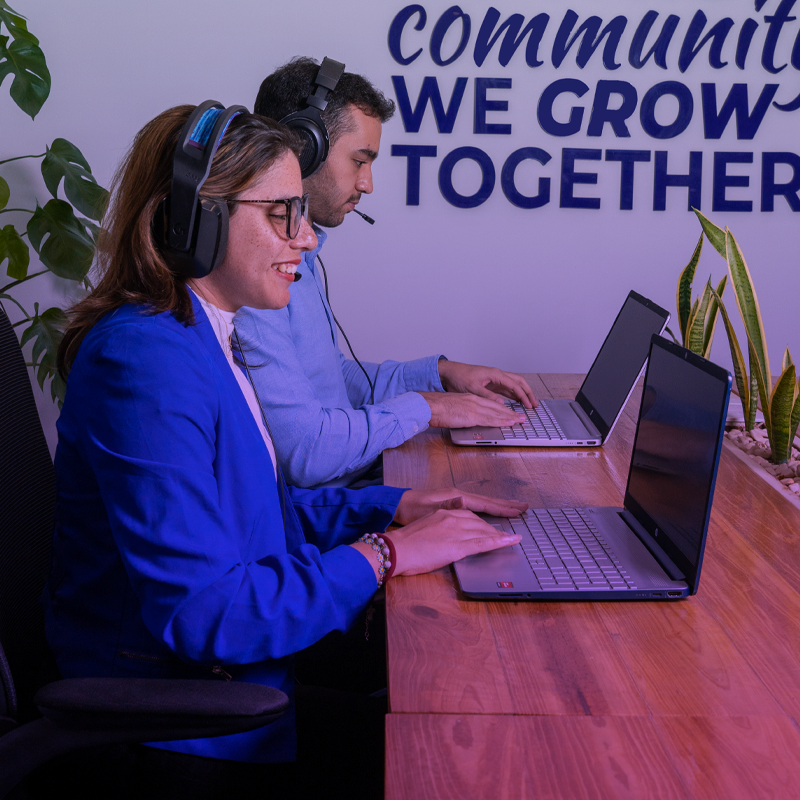In today’s business world, there’s an ongoing debate surrounding the role and significance of a community manager. What exactly does a community manager do, and what are their primary responsibilities?
This confusion arises as we see an increasing number of professional community managers working for companies of all sizes, taking care of their brand’s success on the internet.
For those unfamiliar with the term, dismissing the community manager role as a trendy job title is easy. This position involves “hanging out” on the internet, and it is something anyone can handle.
But that’s a big misunderstanding. In reality, thinking this way can lead companies to let unqualified people handle their online presence, which can often end in a complete disaster.
This article will explore what a community manager does and how they can help a company grow and succeed online. Let’s clarify the confusion about community manager roles and understand why these professionals are valuable.
What Does A Community Manager Do?

A community manager is a social media professional who strategically deploys engagement tactics across online platforms. With a unique blend of skills and experience, they tailor their approach to each project, like artists molding an online presence in line with objectives.
This role is multifaceted and extends far beyond occasional social media updates. Community managers shoulder various responsibilities within the company, often without defined boundaries. Their key role is effectively conveying the company’s vision, mission, and values across diverse online platforms.
They are also pivotal in addressing customer inquiries and doubts about the brand, its products, or services.
Without a doubt, they serve as a crucial link, capable of enhancing a company’s profitability and boosting its visibility. These professionals provide the much-needed social media push to elevate the business to new heights.
What Are The 4 Pillars Of Community Management?
Now that we understand the essence of the community manager job description and who this professional is a little better, it’s time to examine four core aspects of community management, shedding light on what makes this role indispensable for businesses looking to thrive in the digital era.
1. Growth: Expanding Your Online Reach
At the heart of effective community management lies the pursuit of growth. A community manager is not only tasked with maintaining an existing online community but also with expanding it.

They use various tools, such as creating interesting and engaging content, running ads, and collaborating with influencers or brands, to expand their company’s digital reach and attract fresh faces to the digital community.
A vigilant eye on analytics and key performance indicators (KPIs) is essential. Community managers can fine-tune their strategies by tracking metrics such as follower growth, website traffic, and conversion rates and ensure that every effort contributes to the community’s expansion.
2. Engagement: Fostering Meaningful Connections
Having many online followers isn’t enough; they must be engaged and interested in your brand. Engagement is about connecting your brand with the people who follow it. Community managers create engaging content and share it to get people talking and interacting.
They also respond to comments and messages, humanizing the brand and strengthening the bond between the company and its customers.
Engagement isn’t limited to one-way communication. Community managers often facilitate discussions and user-generated content, empowering the community to interact with each other. By building a vibrant and engaged community, businesses can gain brand advocates who not only support the company but also help promote it to a broader audience.
3. Listening: The Art Of Understanding

Listening is fundamental for community management. In an era when consumer feedback can make or break a brand, community managers act as the company’s ears and voice. They vigilantly monitor online conversations about the brand, products, and competitors.
Effective listening goes beyond monitoring mentions. It involves understanding customer sentiment and needs and identifying trends, problems, and issues in the community. This data informs better decision-making, product improvement, and enhanced customer support.
Listening also entails embracing negative feedback as a chance for improvement. Community managers address concerns transparently and proactively, demonstrating a commitment to customer satisfaction and brand integrity.
4. Improvement: Iterating For Excellence
Continuous improvement is the fourth pillar of community management. In the fast-paced era of the internet, there is no standing still. Community managers are dedicated to refining strategies, content, and community experiences to ensure they remain relevant and practical.
They do this by examining data, feedback, and performance information. They determine what’s working and what’s not and make changes accordingly.
Improvement is an iterative process in which community managers experiment with new approaches, A/B testing content, and engagement strategies to discover what resonates best with the audience.
What Are The Benefits Of Having A Community Manager?
You probably already have a good idea of why hiring a community manager is such a good decision for your company based on what we’ve discussed about what they do and the pillars of community management itself. But now, let’s take a deeper look at the main benefits of having one so you can see all the improvements it could bring you!

From enhancing your online visibility to providing stellar customer support, community managers offer many benefits that can transform your digital strategy.
In the following list, we’ll delve into each of these advantages, shedding light on how they can elevate your brand in the digital realm.
Enhancing Your Online Presence
Having a community manager significantly boosts your online presence in today’s digital age, in which having an active, engaging, and up-to-date online presence is vital.
Community and social media managers have the core responsibility of engaging a wider audience through creative tactics. Each “like,” “share,” or “comment” generated by these tactics contributes to a notable increase in your brand’s visibility.
Yet, it’s not just about numbers. Community managers evaluate strategy effectiveness, refining communication to grow your brand’s online following steadily. An active and engaging online presence is vital for brand recognition and success in this digital landscape.
Attracting And Engaging Customers
A community manager can be a game-changer in your quest to attract new customers and enhance engagement. After all, every company’s primary goal is to expand its customer base, boosting its income and business growth. More simply put, More clients mean more income.

Community managers carefully study the market and competitors, figuring out how to make people more interested in your brand.
They do this by creating exciting and helpful content, not just about your brand but also about things that people find attractive. This content attracts potential customers.
But it’s not just about creating content. Community managers also use promotions, word-of-mouth recommendations, and online advertising to attract new customers. The result is a growing group of happy customers who boost your business.
Boosting Your Earnings
Many CEOs consider this the primary reason to invest in community management services. A community manager’s role in increasing earnings and improving ROI is pivotal, as they harness the power of online platforms to boost sales and amplify the impact of your marketing efforts, even the offline ones.
Improving Customer Support
Community managers are instrumental in this aspect because they directly link your brand and its customers in the digital realm, providing timely and personalized responses to inquiries, concerns, and feedback.
Their presence ensures every customer query receives attention, increasing satisfaction and trust. Community managers excel at addressing issues promptly and with empathy, effectively turning negative experiences into positive ones.
Furthermore, they play a crucial role in collecting valuable insights from customer interactions and identifying recurring problems and areas for improvement. This feedback loop guides product development, service enhancements, and overall business strategies.
Defining Your Brand Personality
Crafting a unique brand personality is crucial, and a community manager plays a vital role in achieving this goal. They become your brand’s voice on social media platforms, always sharing content enthusiastically to encourage interaction within the online community.

Customers and followers need to realize that real people are behind your brand. A community manager works to create a friendly and approachable image. They skillfully manage and organize customer feedback and information, using these insights to further marketing initiatives that benefit your company.
In this way, community managers lend a hand to your business by showing on social media that people are behind your brand, ready to assist and meet customer needs. They make your brand feel relatable and trustworthy to your audience.
What Skills Does A Community Manager Need?
Now that you know how many benefits community managers can bring to your company, you’re probably thinking about hiring one and wondering what to look for in one.
If your social media marketing team is small, your community manager must wear many hats and be skilled in various areas. In larger marketing teams, while other specialists may handle detailed tasks like content creation and analytics, your community manager remains an important figure who should possess a well-rounded understanding of various marketing aspects.
Here’s a comprehensive list of essential skills to consider when selecting a community manager and why they are crucial:
1. Effective Communication
Community managers must be adept at conveying your brand’s message clearly and engagingly. They interact with customers, address inquiries, and resolve issues while maintaining a consistent and compelling brand voice.
2. Empathy
Understanding and relating to your audience’s needs and concerns is critical. Empathetic community managers can address customer issues with care, fostering stronger connections and trust.
3. Content Creation

These professionals generate engaging and relevant content to retain your community members’ interest. Skillful content creation drives conversations, boosts brand visibility, and keeps your audience informed and entertained.
4. Crisis Management
In challenging situations or crises, a community manager must remain composed. They should handle issues promptly and professionally to protect your brand’s reputation and reassure concerned customers.
5. Analytical Skills
Community managers need to analyze data and feedback to refine strategies, measure success, and identify areas for improvement. Data-driven decisions are vital for optimizing your online presence.
6. Customer Service Excellence
Exceptional customer service skills are essential. A community manager should efficiently address inquiries, resolve problems, and maintain high levels of customer satisfaction, building loyalty and trust.
Need Help Finding The Perfect Community Manager?
Whether your team is small or large, a skilled community manager with a broad skill set is invaluable. At Freelance Latin America, we can assist you in finding the right community manager, saving you valuable recruitment time and costs with our cost-effective outsourcing services.
With the right candidate, your brand can thrive, engage audiences effectively, and navigate the dynamic world of digital marketing.
Get in touch with us now to find that perfect community manager!
See more articles by Fiorella Toledano.




